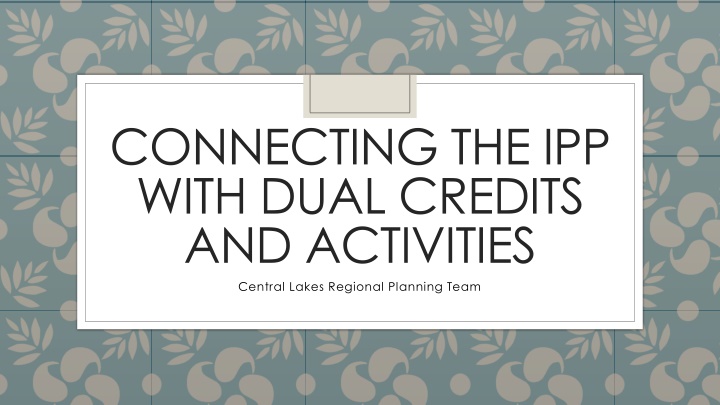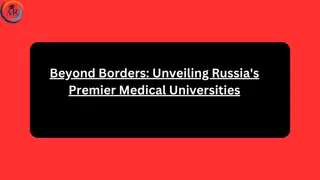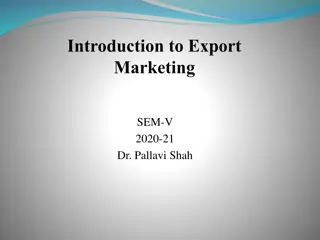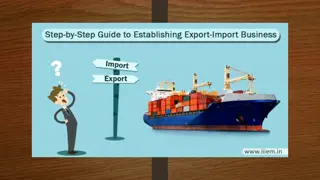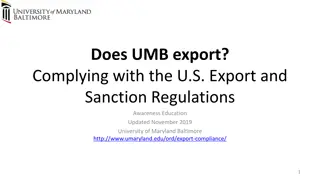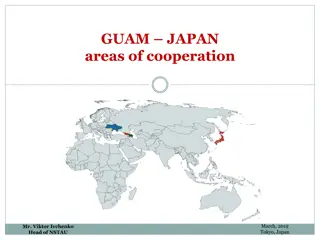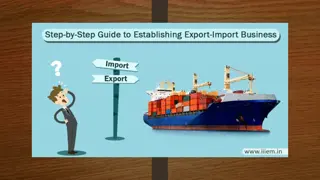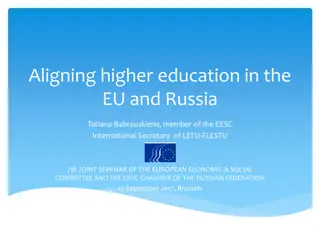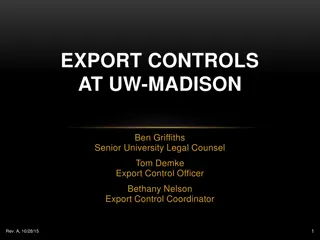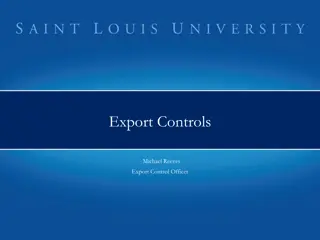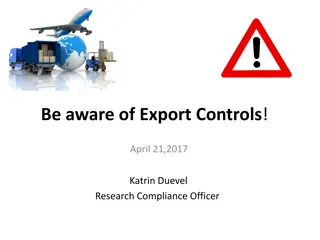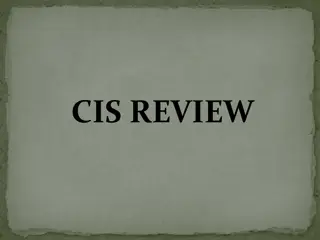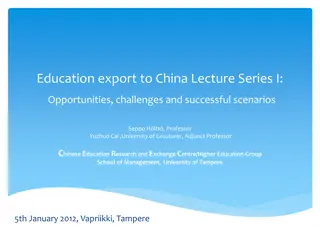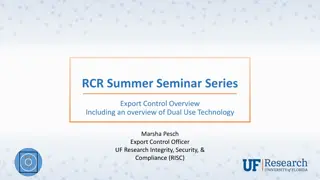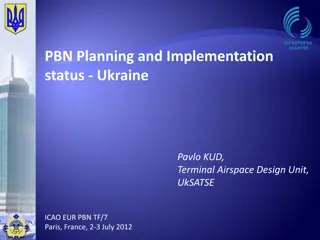Market Realities & Export Opportunities in Russia and Ukraine
Delve into the market realities and export opportunities for U.S. small businesses in Russia and Ukraine. Gain insights on sanctions, export controls, U.S. government contacts, and resources available for companies. Connect with key offices and officers for support and engagement in these markets.
Download Presentation

Please find below an Image/Link to download the presentation.
The content on the website is provided AS IS for your information and personal use only. It may not be sold, licensed, or shared on other websites without obtaining consent from the author.If you encounter any issues during the download, it is possible that the publisher has removed the file from their server.
You are allowed to download the files provided on this website for personal or commercial use, subject to the condition that they are used lawfully. All files are the property of their respective owners.
The content on the website is provided AS IS for your information and personal use only. It may not be sold, licensed, or shared on other websites without obtaining consent from the author.
E N D
Presentation Transcript
CONNECTING THE IPP WITH DUAL CREDITS AND ACTIVITIES Central Lakes Regional Planning Team
Creating Pathways to Success CPS Vision All students leave with a clear plan for their initial postsecondary destination, with confidence in their ability to implement, and revise or adapt, their plan throughout their lives as they and the world around them change. Students will be the architects of their own lives.
Past Assumptions With access to accurate information and some guidance, individuals would independently acquire the skills they needed for effective career planning. Only some students need support and they will seek out assistance as needed. (Krumboltz and Worthington, 1999) Creating Pathways to Success, p. 6
Todays Reality The challenges and opportunities faced by students in this century are unlike those of any previous generation, and that all students today require specific knowledge and skills in education and career/life planning to support them in making sound choices throughout their lives. To make sound career decisions people also need to develop tools [e.g. strategies] for processing the information. (Dietsche, 2010) Creating Pathways to Success, p. 6
TALK TO THE PERSON NEXT TO YOU WHAT DOES IPP STAND FOR?
What is an IPP? Individual Pathway Plan Starting in Grade 7 students will document their learning in education and career/life planning in a web-based Individual Pathways Plan (IPP).7 The IPP becomes the primary planning tool for students as they move through the grades towards their initial postsecondary destination. Ongoing development of the IPP also provides students with a valuable archive of their learning and a record of the resources that can assist them in planning. Creating Pathways to Success, p. 18
Central Lakes RPT Georgian College Bluewater DSB Bruce Grey Catholic DSB Simcoe County DSB Simcoe Muskoka Catholic DSB Trillium Lakelands DSB
Making the connection Yearly team retreat in September to set SMART goals and plan for the upcoming year Individual Pathways Planner discussed Team decided to review existing events for fit Existing: Grade 12 event and resources developed that could apply to Career Classes Committed to work within our existing SCWI Activity funding for 13-14 Proposal to add other events Goal was to address all secondary grades in a way that also met college needs
Grade 9 Pathways New event in 2014 Combine time in a computer lab with My Blueprint or Career Cruising with hands on workshops Each school board group saw one program area Goal to match the students attending with the college programs they would see through their expressed interests in career tools Two workshops from the program area: Photography &Graphic Design / Electrical & HRAC/ Opticianry & Firefighting 95% of students enjoyed their workshops Day ended with the opportunity for students to make notes about what they d learned in their online career tool Knowing Yourself/ Exploring Opportunities
Grade 10 Career Class Resource Created tool to be implemented across RPT member boards in Careers classes Up to 3000 students would have access to this tool Included: Video, PowerPoint, worksheet and Lesson Plan Feedback from Careers teachers has been very positive Exploring Opportunities
PICTURE YOURSELF @COLLEGE
Student Poll Where do you think you re headed when you graduate high school?
What the PROVINCE is saying 34% to 34% to University University 6% 6% 15% Direct to 15% Direct to Workplace Workplace With OSSD With OSSD Apprenticeship Apprenticeship 20% to 20% to College College 25% to 25% to Workplace Workplace without OSSD without OSSD Ontario Colleges Study 2009 Ontario Colleges Study 2009 Dr. A. King, Queen s University Dr. A. King, Queen s University
6 Fears Busted Approx. $4000.00 per year for tuition, books, fees Scholarships, awards, bursaries OSAP (financial aid) I can t afford it Visit a college campus to learn more about what is offered Research colleges and programs at www.ontariocolleges.ca Do an informational interview with someone who works in the field you re interested in Wrong Program? February 1st is the college deadline Some programs don t fill immediately so you can continue to apply after February 1st Some programs have a January start date so you can apply in the summer or even the fall It s too late
6 Fears Busted Most colleges have a centre for access to help people with learning and other disabilities Staff can help you with accommodations that you may need for success Technology exists that can assist you with your courses I have an IEP Some careers do require university but many do not You can explore apprenticeship, college diplomas, college degrees and articulation to get where you want to go . University or Bust No Time There are many options: one year certificates, stand-alone courses, 2 and 3 year diplomas You might only attend school from September April with four months in between to work
Video: Picture Yourself @ College Click Here for Picture Yourself @ College Video
Pathways Within College Pathways within college: diplomas, one year certificates, apprenticeship training, articulation agreements, college degrees Using www.ontariocolleges.ca and www.georgiancollege.ca as resources, each group researches the following elements of their pathway: Duration of the pathway (how long will it take to finish?) Estimated cost of the pathway Three examples of the type of programs they can take within the pathway
Wrap Up Go to www.centrallakes.ca Search Course Info Search Fall, Winter, Spring dual credits Find a dual credit(s) that is of interest to you and list on your group worksheet
Grade 11 Pathways New event 2015 Two locations Barrie and Owen Sound Georgian College campuses Grade 11 College Level English classes Chose not to create a day with typical program area hands on workshops Mock College Lesson What does College Look Like? -- delivered by Learning Strategists Dual Credit Panel hear from students, get information about courses and entry requirements Career Consultant goal setting, use of college Career Match tool Approval rating of 92% on average for all elements 88% said they would consider applying to Georgian College Exploring Opportunities
Grade 12-Program Highlight Day In order to give students and their teachers the chance to learn about new opportunities at the college, this project sees new programs featured in an on-campus experience. Students learn program specific information as well as participating in a learning activity. This year: Interior Decorating, Opticianry, Advertising & Marketing, Fitness & Health Promotion, and HRAC Exploring Opportunities
Grade 12-After Graduation Long standing program that brings grade 12 students without a clear career plan to the college for a series of workshops and a motivational speaker. Industry reps along with college faculty and students explain a career sector such as Hospitality & Tourism, Health & Wellness or Apprenticeship Motivational speaker pushes students to make their own lunch take responsibility for making decisions about their future. Consistently rated positively by 95% or more of attendees Making Decisions and Setting Goals
Transition Planning: SWAC Five School within a College programs at 4 different Georgian College campuses Opportunities provided/planned: Type Focus career assessment to students with individual debrief from career counsellor Visits to other campuses or program areas to hear from academic staff College marketing presentations Mentoring by current college students Panel of past dual credit students now at college Lunch for those accepted with an emphasis on answering questions prior to registration Orientation in fall for dual credit students now college students Connection to First Generation staff Making Decisions and Setting Goals
Pilot for Dual Credit Students Georgian has 7 campuses, with a wide range of service levels RPT chose to bring students from a small campus to the main campus in Barrie to connect them with academic offerings related to their dual credit The Essential Body students had a tour of health sciences labs Culture and Cuisine students had a tour of culinary & hospitality facilities In at least one case, this was life transforming. Seeing the options was exciting for students and helped them choose a program to study. Making Decisions and Setting Goals
Next Steps Working closely with all Boards involved, students who participate in activities and/or dual credits will connect these to their IPP. Initially this will be done Board by Board through teaching staff or a customized approach to accommodate individual Board roll outs. Ultimately, this connection will not only be addressed through teaching staff, but directly with students when the IPP has been fully implemented.
